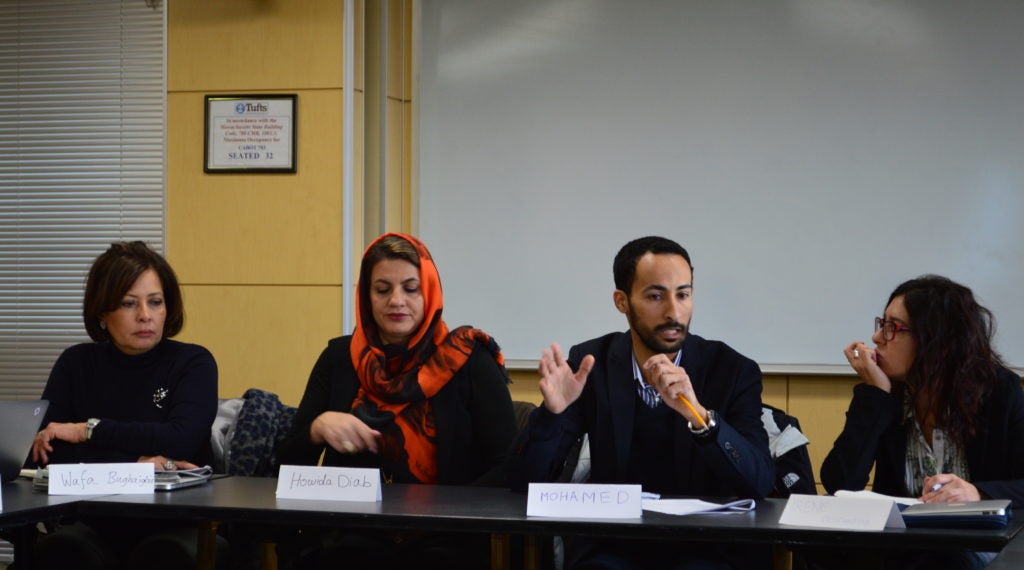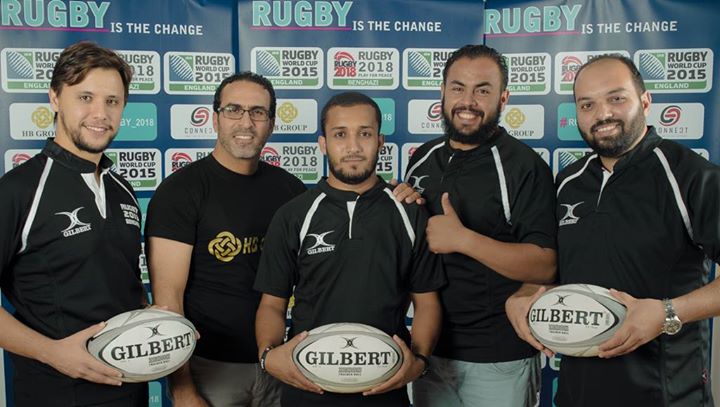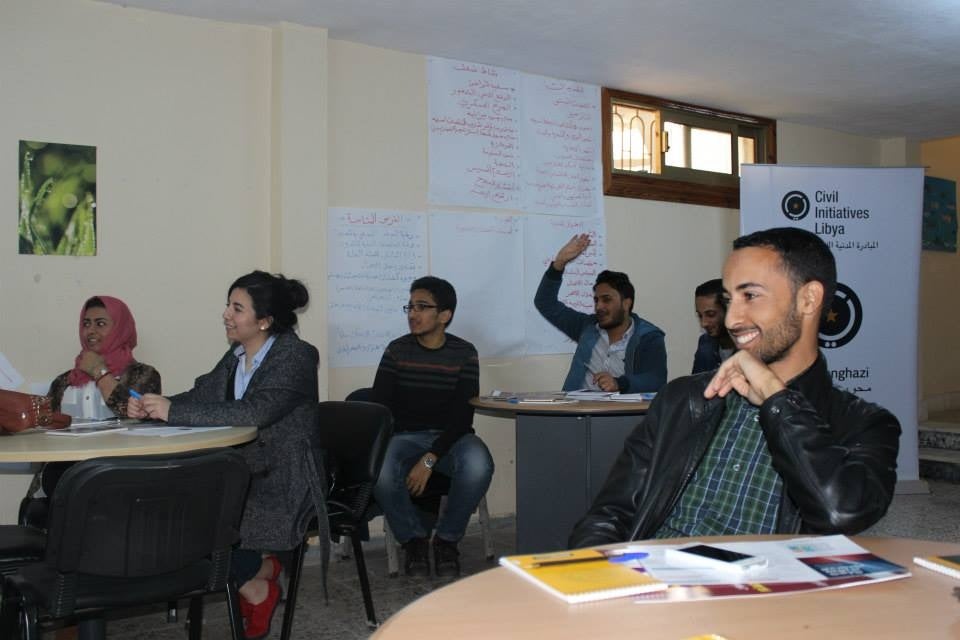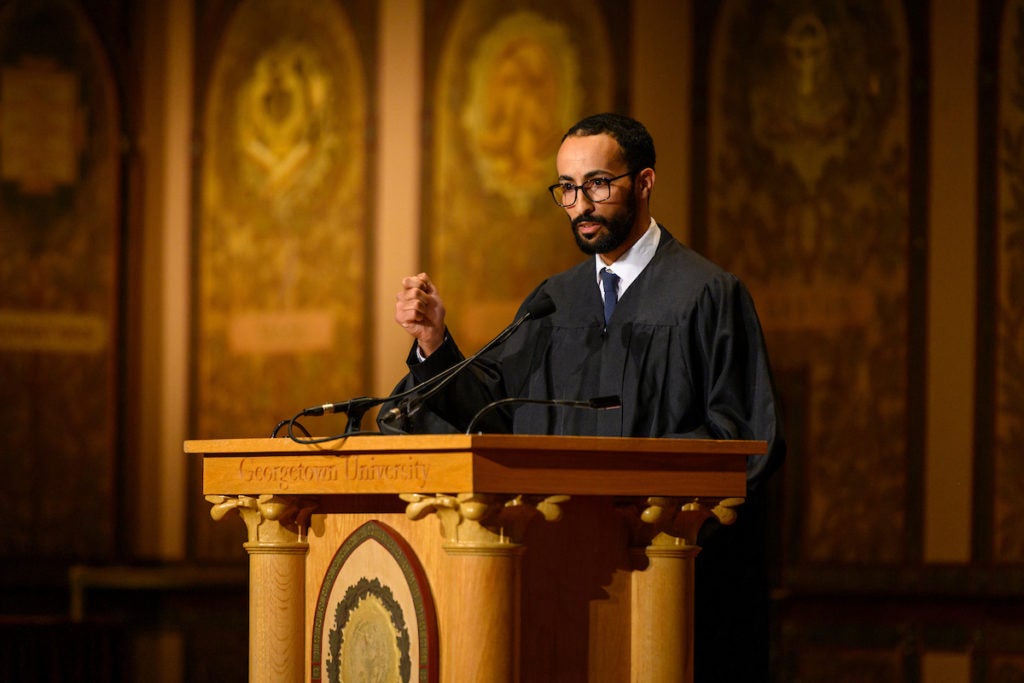Title: MSFS Legacy for the Future: Mohamed Elmagbri (MSFS ’19) and Mohamed Almenfi (MSFS ’20)
This story is part of our MSFS Legacy for the Future series profiling members of the MSFS community who have made, or are poised to make, important contributions to international affairs. Through our Legacy for the Future campaign, you can support MSFS scholarships for talented students like Mohamed and Mohamed and ensure that the leaders and innovators of the future are given the skills and opportunities they need to meet the global challenges of tomorrow, today. Make your contribution to MSFS Legacy for the Future now.
During the academic year of 2019-2020, Mohamed Elmagbri (MSFS ’19) and Mohamed Almenfi (MSFS ’20) were a familiar sight around MSFS. While also juggling family commitments, both students were heavily involved in student groups, participated in a number of extracurricular activities, and maintained a full course load. It would be hard to imagine the program’s home on the seventh floor of Georgetown’s Intercultural Center without the presence of the two Mohameds. However, when both men where starting out in their careers MSFS would have seemed a very unlikely destination for the pair.
As trained engineers, Elmagbri and Almenfi planned to pursue careers in Libya’s energy sector. Growing up in Benghazi, Almenfi had a cousin who worked for a Libyan oil company and moving into the sector seemed like a natural fit. “I could see myself ten years ahead, where I was going, where I was heading,” he recalls. “So linear you can expect the steps and how you go up the career ladder.” Then, in 2011, the Libyan Revolution began. As protests against the government of Muammar Gaddafi turned into violent clashes and then all-out conflict between the state and those seeking an end to Gaddafi’s rule, both Elmagbri and Almenfi contemplated taking up arms themselves.
Uncertainty during the Revolution
What Almenfi remembers most about this period is his uncertainty about how to respond to the upheaval around him. “From a young age, I was inspired when I read about my ancestors’ struggle against the Italian occupation [of Libya in the early twentieth century],” he says. “I admired their determination to build a country and how they sacrificed everything to create Libya. But they fought colonizers, not each other. I never felt that killing a Libyan could be justified for the sake of building Libya. To be honest, I was lost.”
His future classmate Elmagbri was also drawn to the prospect of fighting for a new and better Libya. “I was very close to joining the fighting myself,” he remembers. “My father prevented me from doing that; he told me that I would benefit Libya in other ways in the future. Only a few days after that, an opportunity came up with an NGO and my father encouraged me to volunteer. And that was the start of my seven years of civil society activism.”

Civil society activism
Instead of joining the conflict, Elmagbri and Almenfi instead devoted themselves to supporting civil society groups working toward building lasting peace in Libya. Both worked for Altawasul Association, a Benghazi-based NGO that brought young Libyans into a constitution-drafting process in the aftermath of the 2011 civil war. They organized workshops to solicit youth responses to constitutional issues, facilitated meetings between the Constitution Drafting Assembly and youth activists, and created campaigns to raise awareness of the process among young people.
However, just as Elmagbri and Almenfi were advocating for young people as determiners of a hopeful, post-conflict Libya, schools began to close. Without the school community to keep them safe, many Libyan youngsters were vulnerable to recruitment efforts by militias and violent radical groups, including ISIS. “We saw such scary scenes,” Elmagbri remembers. “Very young people were becoming fighters and going to the frontlines. We thought a lot about what we could do and nothing seemed more effective than sport.”
Rugby 2018
Alongside colleagues and friends, Elmagbri and Almenfi founded Rugby 2018, a rugby-training academy in Benghazi that brings young people into a community where they are safe from militia recruitment tactics. In addition to teaching the participants about how to play the sport, Rugby 2018 encourages thousands of young people to learn about community peacebuilding and social responsibility and to focus on improving their mental health in the aftermath of conflict. It also works to bring children from internally displaced people (IDP) communities in Benghazi to the academy, enabling them to build friendships with local children. This latter initiative is an achievement both men are particularly proud of. “Watching the IDP kids playing with Benghazi kids after being isolated in camps so long was one of the most memorable moments in my life,” Almenfi says.

As time wore on, it became apparent that neither Almenfi or Elmagbri would be returning to their engineering careers. Elmagbri focused on working locally in Benghazi, co-founding the Benghazi Crisis Coordination Team which designed impact projects to support IDPs and the Local-Local Initiative to organize administrative and IT capacity building programs for the Benghazi Municipal Council. Almenfi took a job with a French NGO, Acted, where he ran a training center to build capacity for nascent civil society organizations. As they took on more projects, they began to look for opportunities to gain the educational experience that would help further their goals for their communities. “I came from an engineering background,” Almenfi explains. “But when war broke out, I knew I had to pivot my educational journey towards foreign affairs and international development. It was the best way for me to help my country to stand on its feet again.”
Choosing MSFS
Elmagbri and Almenfi received a Civil Society Leadership Award from the Open Society Foundation to fund graduate study in international affairs. The MSFS program at Georgetown was the obvious choice for both of them. “I wanted to focus on governance in conflict-affected countries, a topic that falls at the intersection of political, economic, and social studies,” Elmagbri remembers. “Of all the places I looked at, MSFS was the only program with classes that captured the multidimensionality of concepts such as governance.”
For Almenfi, the opportunities to build important networks made MSFS appealing. “Being in D.C., MSFS gives you the opportunity to expand your academic knowledge as well as your network,” he says. “Here, I can build connections with organizations that will make my efforts to build peace in Libya most impactful.”

MSFS has helped both students expand their civil society work and international affairs experience. As a recent graduate working in governance, Elmagbri says that MSFS deepened his understanding of the field and has helped him to see better the issues that affect peace and stability in his home country. “I worked on local governance issues in Libya before coming to MSFS but now I see other aspects, such as the role of the private sector, the effects of natural resources, and state-society relations that are particularly important to a country like Libya,” he says. “MSFS better defined my interests and now I feel empowered to pursue them.”
Almenfi is in his second-year at MSFS and says that the program has already broadened his horizons. For example, participating in the annual MSFS-Institute for the Study of Diplomacy international negotiation simulation, which last year focused on peace talks in Syria, piqued his interest in developing wider Middle East regional expertise. “That was a fascinating experience as we were working with people who were actually negotiating a peace deal in Syria,” he explains. “MSFS gives me exposure to different experts and practitioners who I can learn from. It has inspired me to dream big and branch out into becoming a regional expert.”
Hopes for Libya’s future
Ultimately, both Elmagbri and Almenfi plan to use their MSFS degrees to return to Libya and continue their peacebuilding efforts with newfound experiences, perspectives, and skills. Elmagbri is currently working in Tunisia, where he is in the process of establishing a think and do tank to encourage young activists to research, publish, and discuss issues that matter to Libya. Almenfi is looking to expand his regional expertise before pursuing a career in politics. “After gaining more knowledge and experience in state building, my ultimate goal is to enter the political arena in Libya,” he says. “Enforcing the rule of law, drafting worthwhile policies, and advocating for peace are my main goals as well as developing civil society organizations so they can be an effective communication channel between politicians and the people in Libya.”

And, while MSFS has provided both men with the knowledge and hard skills they will need to have successful careers, both agree that one of the biggest benefits of MSFS is something more intangible: the community. A sign of the respect that he held among his MSFS classmates, Elmagbri was elected by his fellow students to be the student speaker at the MSFS graduation ceremony in May 2019. In his speech, Elmagbri described how difficult it was for him and his wife to move to the United States “with a handwritten passport from a country under a travel ban” but said that they had been supported by a network of committed and talented peers. “The people in this room will change the world,” he said. “It has truly been an honor to work and study alongside all of you.”
As Elmagbri and Almenfi look ahead, both feel that their MSFS experience will help them to secure the future they want for themselves and their communities. Referring to two of the program’s core values, leadership and service, Almenfi emphasized the importance of the MSFS mission: “The world is changing so rapidly and the challenges are getting bigger and bigger. We need service-oriented leaders who are committed to helping their societies be better and who believe that they can make that change.”
Support more students like Mohamed Elmagbri and Mohamed Almenfi to attend MSFS. Donate to MSFS Legacy for the Future now.